‘We Won’t Drop the Baby’ sheds light on parents with Cerebral Palsy
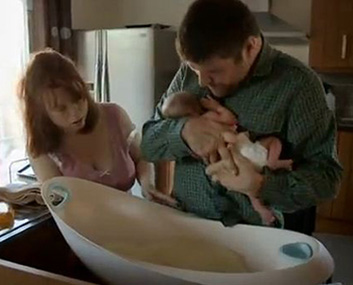
Parenting with Cerebral Palsy. British couple Adele and Laurence Clark prove that having Cerebral Palsy – and other disabilities – need not be a barrier to becoming involved, active parents.
Filmed, Produced and Directed by: Zoë Callan
Executive Producer: Elspeth O’Hare
Executive Producer for BBC: Sam Anthony
Narrator: David Tennant
Starring: Adele and Laurence Clark and Family
Rating: Not Rated, birth talk and comedic swearing
Genre: Documentary
Length: 48 minutes, 28 seconds
BBC Scotland/IWC of the Zodiak Media Group
They’re a young couple like many others their age. Adele and Laurence Clark have been married for nine years, they’re pursuing careers, they’re deeply in love, and they are parents to a 6-year-old son who is a bundle of energy. They are also soon-to-be-parents to another son.
And as the couple contemplates how their lives will change with the addition on a new son, they have to consider some issues that other parents likely will not have to face: the fact that they both are parenting with Cerebral Palsy.
But is having Cerebral Palsy a barrier to parenting, or is it not as impactful as one might believe? That question is one of many explored in the hour-long documentary “We Won’t Drop the Baby,” which was produced by the BBC One and IWC of the Zodiak Media Group.
In the documentary, Adele and Laurence share their personal journey from the early months of the couple’s pregnancy throughout the birth, which includes how they made the decision to have another child, what their obstacles – real and perceived – are, and how those issues are overcome.
The message that having a disability is never a barrier to caring for and loving a child is a prominent theme of the documentary.
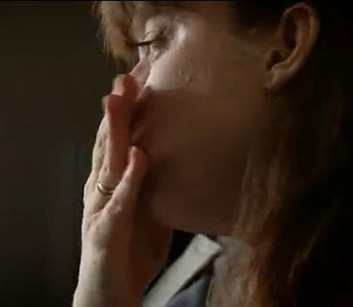
The documentary opens at about the four-month mark in Adele’s pregnancy. Laurence is one of Britain’s most sought after stand-up comedians, and performs about 100 shows per year. It took Adele six years to convince Laurence to have another child.
One of the major themes in the film is that Adele is hoping that she can give birth to her son, whom will be named Jamie, naturally. This is despite the fact that her older son Tom was born by caesarean section.
“I just want to try to experience it in the same way most women do,” she said.
There are some issues to consider, however. Adele’s Cerebral Palsy has affected her lower body in such a way that she may not be able to push in the way other women do. In daily life, she relies on a cane or a walker. Through several doctor’s appointments, Adele’s plan is debated and modified until all of the parties devise a birth plan that is best for both mother and baby.

In the meantime, the couple talks at length about the how other people react to the fact that they are parents.
“We just chose to get on with it and not really see it as an issue,” she said, explaining that the perceptions of others come as a surprise. “I would be out at the local supermarket, for example, and complete strangers would stop and ask me how I manage, and quite frankly, it’s none of their business.”
For Laurence’s part, the fact that he’s a parent with Cerebral Palsy contributes to his comedy routine schtick.
One decision the couple made early on, both when Tom was born and later when Jamie came along, is that they would not seek out pre-natal care that included information about whether the child will be born with a disability, or not (both their children, Tom and Jamie, were born without disability).
As the birth approaches, the film also explores the modifications that must be made to the couple’s home so that they can accommodate a new baby and ensure that Laurence, who uses a wheelchair, can travel from room-to-room with ease. The film also outlines Adele’s emotional journey during her pregnancy, which includes her apprehensiveness about the fact that Laurence will be departing for his comedy tour for several weeks almost immediately after she gives birth.
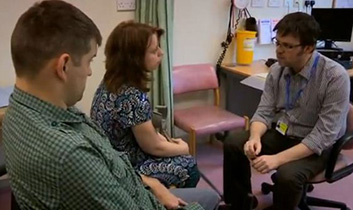
“Some are about the opinion that we shouldn’t have kids, but what can you do about that? We’ve chosen to have a family and we manage just fine.”
– Adele Clark
“A lot of people don’t get what they need from their parents – a lot of love and attention. Our boys will always get that. Is our impairment an issue?”
– Adele Clark
At the heart of “We Won’t Drop the Baby” is that parenting, for Adele and Laurence Clark and for others with disabilities, is something that can be successful and rewarding. The Clarks engage in many of the same activities and take care of their children in much the same way that other parents do; with some slight modifications.
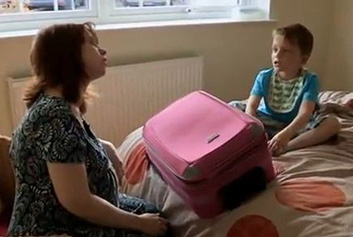
Tom sees his parents the same way as other children view their able-bodied parents; in fact, he has asked Laurence when he will receive a wheelchair, too.
“We Won’t Drop the Baby” explores a topic that few films do; it’s rare to have a bird’s eye view of on such an intimate situation. It’s also rare to have subjects that are so open about their individual situation share for the cameras.
“Some are about the opinion that we shouldn’t have kids, but what can you do about that? We’ve chosen to have a family and we manage just fine,” Adele said. “A lot of people don’t get what they need from their parents – a lot of love and attention. Our boys will always get that. Is our impairment an issue?”
The message of “We Won’t Drop the Baby” is that when it comes to having a family of one’s own, the possibilities are limitless for all of us.
To watch the documentary, visit:

To learn more about Laurence Clark, visit:
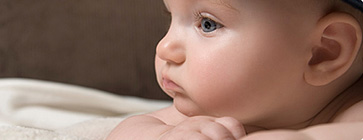
Of course parents already know their child’s journey is the stuff movies are made of, but as it turns out, there are several movies about individuals with Cerebral Palsy and how their condition has affected their lives. Here are some films that tell stories about inspiring people.





